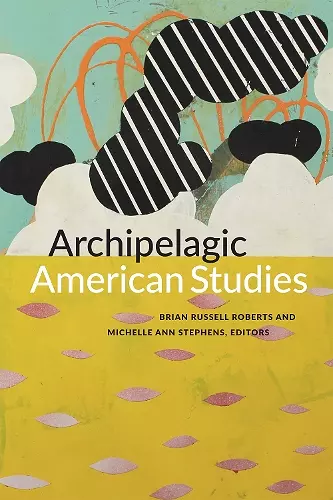Archipelagic American Studies
Michelle Ann Stephens editor Brian Russell Roberts editor
Format:Hardback
Publisher:Duke University Press
Published:16th Jun '17
Currently unavailable, and unfortunately no date known when it will be back
This hardback is available in another edition too:
- Paperback£25.99(9780822363460)

Departing from conventional narratives of the United States and the Americas as fundamentally continental spaces, the contributors to Archipelagic American Studies theorize America as constituted by and accountable to an assemblage of interconnected islands, archipelagoes, shorelines, continents, seas, and oceans. They trace these planet-spanning archipelagic connections in essays on topics ranging from Indigenous sovereignty to the work of Édouard Glissant, from Philippine call centers to US militarization in the Caribbean, and from the great Pacific garbage patch to enduring overlaps between US imperialism and a colonial Mexican archipelago. Shaking loose the straitjacket of continental exceptionalism that hinders and permeates Americanist scholarship, Archipelagic American Studies asserts a more relevant and dynamic approach for thinking about the geographic, cultural, and political claims of the United States within broader notions of America.
Contributors
Birte Blascheck, J. Michael Dash, Paul Giles, Susan Gillman, Matthew Pratt Guterl, Hsinya Huang, Allan Punzalan Isaac, Joseph Keith, Yolanda Martínez-San Miguel, Brandy Nālani McDougall, Ifeoma Kiddoe Nwankwo, Craig Santos Perez, Brian Russell Roberts, John Carlos Rowe, Cherene Sherrard-Johnson, Ramón E. Soto-Crespo, Michelle Ann Stephens, Elaine Stratford, Etsuko Taketani, Alice Te Punga Somerville, Teresia Teaiwa, Lanny Thompson, Nicole A. Waligora-Davis
"This book will become seminal for two key reasons at least: (1) it comprehensively demonstrates the Americas are archipelagic; and (2) it pushes relational thinking further than to date, suggesting we are now straining at some older concepts and verging on new theoretical frameworks. In doing so, Archipelagic American Studies both speaks back to American studies and cultural studies, and develops useful theoretical
concerns for island studies scholars, and others invested in wider relational and archipelagic turns." -- Jonathan Pugh * Island Studies Journal *
“A transformative series of essays. Archipelagic American Studies sets an important new course toward geographic, political, and cultural recognition of Island spaces and places.” -- Rebecca Hogue * Contemporary Pacific *
"The many essays in this book . . . provide readers with opportunities to rethink their own relationship(s) with archipelagos and how we may situate our work. . . . Transformative." -- Emalani Case * Journal of Pacific Studies *
"Collectively, the anthology highlights the limitations of US-centric understandings of archipelagos and presents a nuanced display of the lasting impacts and contemporary reaches of US imperialism. . . . I highly recommend the collection to scholars concerned with the Asia Pacific region’ as the editors offer a systematised and organised arrangement of theories and methodologies for thinking like an archipelago."
-- Sylvia C Frain * Asia Pacific Viewpoint *
"This book provided me with tools to begin to think about my own group of islands differently, to recentre my concerns and to begin to unravel the consequences of dominant, continental thinking in real-life situations." -- Emalani Case * Journal of Pacific History *
"As we read Archipelagic American Studies, in fact, we embark on a journey which is full of twists and turns, instructive and rewarding, and for which Roberts and Stephens provide an invaluable road map, a comprehensive introductory essay which enables us to impart meaning and purpose to every stop in our journey in relation to the overarching trajectory of the volume." -- Maria Cristina Fumagalli * Journal of American Studies *
"Archipelagic American Studies is, overall, an important intervention in and beyond the discipline of American studies. Its remapping of the United States and the Americas at large as an archipelagic formation is a bold gesture that has implications for the many fields concerned with spaces where land and see meet and with the peoples and cultures that inhabit them. The book is a necessary read for anyone interested in decontinentalizing scholarship related to empire and nation." -- Natalie Catasús * sx salon *
ISBN: 9780822363354
Dimensions: unknown
Weight: 816g
496 pages